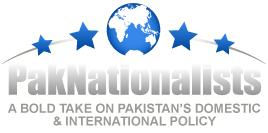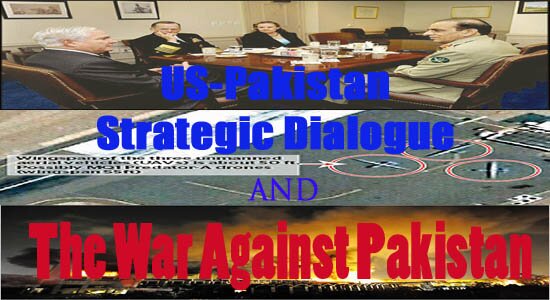
 Print This Post
Print This Post  Email This Post
Email This Post

US support to Pakistan is limited to papers and statements. Washington opposes Pakistan’s energy choices, opposes a nuke deal with China, opposes gas from Iran, and is undermining Pakistani interests. Time for Pakistan to draw a line.
By TAYYAB SIDDIQUI | Monday, 18 October 2010 | The News International
WWW.PAKNATIONALISTS.COM
ISLAMABAD, Pakistan—Intensive discussions and high-level meetings are taking place in preparation for the forthcoming meeting of the Strategic Dialogue in Washington scheduled to begin on Friday. It will be the third round of the dialogue. The last was held in Islamabad in July.
The idea of the Strategic Dialogue is to promote the “strategic partnership” outlined in 2006 during President Bush’s Islamabad visit. It started off on a high note. The joint statement issued by Presidents Musharraf and Bush underscored the determination of the two leaders “to strengthen the foundation for a strong, stable and enduring relationship.” The statement identified a large spectrum of issues related to bilateral ties, ranging from economic ties, trade and investment, to a “robust defense relationship that advances shared security goals”.
The Strategic Dialogue was to be chaired by top officials of the Pakistani foreign ministry and the US State Department, the foreign secretary in Pakistan’s case, but was raised to ministerial level in October 2009 during Hillary Clinton’s visit to Pakistan. The Pakistani foreign minister and the US secretary of state were “to meet regularly to review issues of mutual interest” and to “undertake steps in areas of economic growth and prosperity, energy, peace and security, social-sector development, science and technology, democracy and non-proliferation”. Despite these lofty goals and the ambitious agenda, there has hardly been any movement towards the fulfillment of any of these objectives.
To ensure a significant expansion of bilateral ties, including mutual trade and investment, a “key step” was conclusion of a Bilateral Investment Treaty. Negotiations have since continued but the BIT has yet to see the light of day.
Decisions were taken “to explore ways to meet Pakistan’s growing energy needs and strengthen its energy security” and develop public-private collaboration. Considering Pakistan’s severe energy crisis, nothing correspondingly serious or urgent has been done, except for a pledge of $125 million announced by Secretary Clinton in 2009.
The amount is meant to be utilized to upgrade the thermal power stations at Guddu, Jamshoro and Muzaffargarh. The progress, if any, is only on paper. Meanwhile, the US has openly opposed Pakistan’s agreement with Iran for a gas-pipeline project to meet its critical energy requirements.
Pakistan’s request for a civilian nuclear deal similar to the one the US has signed with India has been rejected, in view of Pakistan’s “track record” in the nuclear field. There is little hope of any softening in the US attitude over this point.
Foreign Minister Qureshi is reported to have raised this issue before his interlocutors during his recent visit to Washington, and though he claimed that “the talks were very satisfactory” the facts do not corroborate his statement. A senior US official bluntly stated that such a deal “is not on the table, and the Pakistani views are well-understood and we listen carefully to them.”
To put Pakistan on the defensive, the US authorities have renewed the demand for access to Dr A Q Khan and expressed opposition to China’s building the Chashma nuclear reactor.
During his Senate confirmation hearings last month, US ambassador-designate to Pakistan Cameron Munter declared: “I intend to raise the question again of our repeated requests to have our people be able to interview Khan.” Questioning Ambassador Munter during the hearing, Senator Richard Lugar also expressed his concerns over Pakistan’s control on its nuclear inventory. The State Department has also opposed Sino-Pakistani nuclear cooperation, in particular China’s plan to build two reactors, holding it a violation of the Nuclear Supply Group (NSG) regime, ignoring the fact that US companies have similar agreements to sell reactors to India.
The three major dimensions of our relations – trade and investment, energy and defense – have failed to register any major development during the last four years. Hence, to accredit this dialogue process with any tangible significance would be too optimistic.
There are a host of other issues, such as US violations of Pakistan’s air space, the increasingly deadly drone attacks, delayed payments of the Competitiveness Support Fund (CSF), supply of defense equipment and strategic issues which are not in the public domain will form the staple of the discussions in the fourth round.
What has the so-called Strategic Dialogue or Strategic Partnership delivered for Pakistan? One may also ask what happened to the 56-pages dossier that the Pakistani delegation submitted to the US in the previous round.
The US policy regarding the Strategic Dialogue has been in conformity with its own national objectives, and that element in itself cannot be faulted. But we need to outline our national agenda and draw the red line, even if belatedly. Washington needs to be told that the partnership cannot work without the United States meeting reciprocal obligations and that both sides must work only within the agreed parameters.
Our leadership should not take at face value President Obama’s assurances that the US is “seeking long-term engagement and will remain a strong supporter of Pakistan’s security and prosperity long after the guns have fallen silent.” Once the US makes a safe and (honorable?) exit from Kabul, Pakistan will merely receive the attention deserving of a “world’s 5th most unstable country”, in the words of the State Department’s Global Peace Index (GPI) report released in June.
Mr. Siddiqui is a former ambassador and an adviser to the Senate Foreign Relations Committee. This op-ed appeared in The News International. Reach him at
© 2007-2010. All rights reserved. PakNationalists.com
Verbatim copying and distribution of this entire article is permitted in any medium
without royalty provided this notice is preserved.







The correct link is
For those that want to know the TRUTH here it is
!/notes/syed-zaid-zaman-hamid-official/pakistan-and-united-states-strategic-dialogue-truth/138019526247187
To web editor, please delete this reply as the link is incorrect
In 1955 one of the Jewish papers in London stated that Arabs were no danger to Israel the real danger was Pakistan. It also stated that all efforts should be made to break up Pakistan. Zionist are detrmind enemy. They demande the creation of Israel they achieved it by balckmailing UK during 1914-1918 war. UK sent one million troops to Palestine and in truth Israel was created 1918. The mendate etc were all big drama. So the demand to break up Pakistan is still on table added to it is dimentaling of state of Turkey. We can see from what is happening in Turkey’s Eastren Borders.
Along with UK and France Zionists control all of USA’s life lines. Keep this in mind and ask the question is USA Pakistan’s friend or ally and the answer is that far from it USA is the proverbial Snake in the Grass. Looking at the poverty of Pakistani people and insecurity of individual it must be concuded without doubt that we must cut our diplomatic ties with this misschief making entity. Iran has become a major power since it cut its relation with USA. Time we put faith in our People and recoverd our potential.
Salaam brother, i have lived in uk all my life, and i know these people inside out, you are absolutely correct to say Pakistan itself is a top target in the zionist-wests agenda. The only problem for us is, our own leaders are also at their side, people like mush bin bush, and mr 10%, their heroes are kaml ata turk, the british agent that kufrized Turkey. They want our capital to be Kufrabad.
Did you hear the latest ?, our misleaders have shook hands to spill Pakistani blood for $2 billion. I told you we would be sold out. Nice dialogue ehhh ?
The GOLD MEDAL pak army has been recruited for mercenary work, for the US to kill more muslims…..shame.
I dont think the Islamic Khaleefah would ever agree to this. He would say, get out of Pakistan, take your dirty money, and we are not gonna pay any interest to the world bank because it is haram.
The only dialogue going on here is how can they both benefit the American Vulture some more ? and how much scraps will be given as payment ?
Or maybe the government will actually represent the people ? yeah right !
More likely spin will appease pakistanis they are not being sold out, yes ?
Even our National Heroes Dr Abdul Qadeer Khan are on the menu.
Our dear “leaders” should not even be sitting at the feeding table until innocent Dr Afia Siddique is returned home, and reparations paid.
I am afraid our mis-leaders have a foot in each camp, so they can never represent the interests if the ummah. 60 years is proof of that.
Only the sincere Islamic leadership of the Khaleefah implementing Islam would do that.
[...] What Strategic Dialogue? [...]